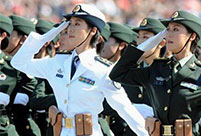

BEIJING, Aug. 9 -- The memorial services in Hiroshima and Nagasaki should serve as an opportunity for Japan not only to commemorate the victims of atomic bombs but also to have a thorough reflection upon its history of militarism.
Starting Thursday, Japan has held several high-profile events to mark the 70th anniversary of the bombings of Hiroshima and Nagasaki, the only two nuclear attacks in human history.
Hiroshima's memorial services on Thursday were attended by the city's mayor and Prime Minister Shinzo Abe, both of whom had addressed a crowd of about 55,000 people, including survivors of the attack, their descendants, peace activists and representatives from about 100 countries and regions.
Abe also attended, accompanied by U.S. ambassador Caroline Kennedy, the memorial services in Nagasaki Sunday.
It is undeniable that the nuclear bombings of Hiroshima and Nagasaki 70 years ago are real tragedies for the whole mankind. It is worth sympathizing as hundreds of thousands of innocent civilians died in the blasts of the atomic bombs, or from after-effects in the months and years to follow.
However, considering what has been said and done by the incumbent prime minister since he took office, a hidden context behind those commemorating events needs particular attention.
While keeping evading from Japan's responsibilities in its war past, Abe and his cabinet have been attempting to re-brand their country as a victim of World War II and glorify its war criminals, who are revered in the notorious Yasukuni Shrine.
As full sympathy should be given to the innocent lives perished in Hiroshima and Nagasaki in 1945, it should also be kept in mind that those lives were, by no means, the only victims of the war Japan had initiated.
Millions of innocent people were mercilessly massacred, cities and villages pillaged, as Japanese army evaded China and other Asian countries only to satisfy its militarism ambitions.
Aside from paying respect to the Japanese victims of the atomic bombs during the memorial services, the Japanese authorities and people should also condemn the perpetrators of the war crimes and reflecting upon the frenzied ideologies that resulted in all the tragedies.
The craziness of Japanese militarists during WWII is one of the major causes that the two cities vaporized in the mushroom clouds. Even facing a certain failure, Japanese militarists rejected the Potsdam Proclamation in 1945, because in their eyes the lives of civilians were irrelevant comparing to their ambitions.
The tragedies of Hiroshima and Nagasaki, along with the heinous crimes the Japanese armies committed in other countries, are the horrid examples of what frenzied militarism can cost us.
In fact, Japanese militarism is not only a danger to Japan's neighbors and regional stability, but also an alarming threat to the Japanese citizens.
As a result, the tendency of militarism resurgence in Abe's government -- pushing new security bills, holding an ambiguous attitude toward the country's war past and the covert attempts to whitewash its war criminals -- is particularly worrying.
It is obvious that many Japanese people do not like where Abe's ultra-rightist government is heading, either.
When Abe addressed the crowd Thursday in Hiroshima, shouts of protest rang out from the audience and around the park. "Retract the war bills," shouted the protesters, holding banners. In Nagasaki, similar protests took place when Abe addressed the crowd.
It is high time for Abe and his cabinet to realize that the best way to commemorate those who perished in the atomic bombings is to sincerely reflect upon its war past, because those who cannot learn from history are doomed to repeat it.
 Female soldiers add color to military parades
Female soldiers add color to military parades Taiwan campus belle with gorgeous look
Taiwan campus belle with gorgeous look  Stunning photos of China’s fighters and airborne troops
Stunning photos of China’s fighters and airborne troops Mums stage breastfeeding flash mob
Mums stage breastfeeding flash mob PLA South China Sea Fleet conducts live fire exercise
PLA South China Sea Fleet conducts live fire exercise Beauty of Tsinghua University transforms into car model
Beauty of Tsinghua University transforms into car model Official shot having sex with two college girls
Official shot having sex with two college girls Moscow “spider-man” climbs Chinese skyscraper
Moscow “spider-man” climbs Chinese skyscraper No cleavage allowed at China’s largest gaming expo this year
No cleavage allowed at China’s largest gaming expo this year Shared destiny for Asia: FM
Shared destiny for Asia: FM Web police stations not to curb expression
Web police stations not to curb expression More civil servants leaving their jobs for better pay, sense of achievement
More civil servants leaving their jobs for better pay, sense of achievement Japan struggles to deal with legacy of comfort women system, compensation
Japan struggles to deal with legacy of comfort women system, compensationDay|Week